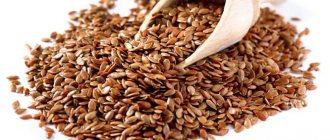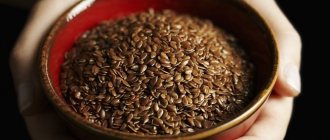Back to list Previous article Next article
21.06.2021
Tags:
useful, flax seeds
4.5/5 — (8 votes)
Flaxseed is a plant food that contains healthy fats, antioxidants, and fiber. Some call it a "functional food." This means that a person can use it to improve their health.
People grew flax as a crop in ancient Egypt and China. In Asia, it has been used in Ayurvedic medicine for thousands of years.
Today, flaxseed is available in the form of seeds, oil, powder, tablets, capsules and flour. People use it as a dietary supplement to prevent constipation, diabetes, high cholesterol, heart disease, cancer and several other diseases.
Nutrients in flaxseed include:
- lignans,
- antioxidants,
- fiber,
- protein and polyunsaturated fatty acids such as alpha-linolenic acid (ALA), or omega-3.
Consuming these nutrients can help reduce your risk of developing various diseases.
However, there is currently insufficient evidence to support all of these hypotheses. Let's look at what research says about flaxseed and its possible benefits.
Benefits of flax seeds
Flax seeds help with problems with the digestive system.
Flax helps cope with various disorders of the digestive system. This plant contains the following substances:
- Plant proteins quickly saturate a depleted body.
- Fatty acids increase human immunity. When consumed regularly, they help cope with the symptoms of dangerous diseases.
- When eating low-quality food, harmful components enter the intestines, poisoning human tissue. They easily penetrate the human blood and lead to the development of diarrhea.
- Polysaccharides reduce the negative effects of toxins on the body.
- Vitamins help strengthen the immune system and normalize the functioning of all body systems.
- Lignans are plant fibers that have strong antioxidant effects. They destroy bacteria and viruses that come with contaminated food.
- It is impossible to overestimate the effect of lecithin on brain cells.
- Selenium cleanses blood vessels and helps remove harmful components from the body.
Flax seeds are used as:
- anti-inflammatory agent;
- they accelerate wound healing;
- protect the intestinal walls from the effects of harmful bacteria and toxins;
- have an antisclerotic effect;
- stimulate the intestines and thereby help cope with constipation;
- flax is used in the treatment of various forms of gastritis.
Possible beneficial properties of flax
Flaxseed contains several nutrients that may have various health benefits.
Like other plant foods, flaxseed is rich in antioxidants. They can help prevent disease by removing molecules called free radicals from the body. They arise as a result of natural processes and environmental influences. If there are too many free radicals in the body, oxidative stress can develop, which leads to cell damage and disease. Antioxidants help remove free radicals from the body.
Flaxseed is a good source of lignans, which have antioxidant properties. According to some scientists, flaxseed may be more than 800 times richer in lignans than most other foods.
The following sections take a closer look at the possible benefits of flaxseed.
Reducing the risk of cancer
Flaxseed contains omega-3 fatty acids. Research shows that they may help prevent the growth of various types of cancer cells. One 2013 study found a lower incidence of breast cancer among women who regularly consumed flaxseed.
Additionally, in 2022, the authors of the review concluded that flaxseed may help reduce the risk of developing breast cancer after menopause.
Lignans are a type of phytoestrogens, which are plant-derived nutrients that act similarly to estrogen. There was previously concern that phytoestrogens might increase the risk of breast cancer, but recent research suggests they play a protective role.
Normalize cholesterol levels and improve heart health
The American Heart Association (AHA) recommends eating more fiber and omega-3s to promote heart health. Lignans may also help prevent cardiovascular disease. Flaxseed contains all of these nutrients.
Flaxseed also contains phytosterols. They are similar in structure to cholesterol, but they help prevent cholesterol from being absorbed in the intestines.
Therefore, consuming phytosterols may help lower the levels of low-density lipoprotein (LDL), or “bad” cholesterol, in the body.
In 2010, researchers studied the effect of flaxseed on cholesterol levels in men. Participants took a 20 mg lignan capsule, a 100 mg capsule, or a placebo for 12 weeks. After taking lignans, cholesterol levels decreased, especially in those who took the 100 mg capsules.
Researchers in a 2012 study of 17 people found that eating flaxseed lowered cholesterol and helped the body eliminate fat, although they noted that overall diet may also play a role. A team of researchers suggested that flaxseed may be beneficial for lowering cholesterol levels.
Some scientists have also linked omega-3 oils, commonly found in fatty fish, to reduced cardiovascular risk. The researchers suggested that flaxseed could provide an alternative to marine sources of omega-3s.
Relieving Arthritis Symptoms
According to the Arthritis Foundation, flaxseed may help reduce joint pain and stiffness . Some people take it for rheumatoid arthritis, lupus, and Raynaud's phenomenon.
Reducing hot flashes
In 2007, a group of scientists published results suggesting that flaxseed may help reduce the frequency or severity of hot flashes in women not using estrogen therapy during menopause.
However, in 2012, following further research, the same group of scientists concluded that flaxseed actually had no effect.
Increased blood sugar levels
Lignans and other phytoestrogens may help reduce the risk of developing chronic diseases such as diabetes.
In 2013, scientists gave 25 people 0g, 13g, or 26g of flaxseed every day for 12 weeks. Participants had prediabetes and were either obese or overweight men or women who had experienced menopause.
The 13 g dose was found to reduce glucose and insulin levels and improve insulin sensitivity, while other doses had no such effect.
Additionally, a 2016 study in rodents found that compounds found in flaxseed may help reduce the incidence of type 1 diabetes and delay the onset of type 2 diabetes. However, these results may not apply to humans.
That same year, 99 people with prediabetes took 40g or 20g of flaxseed or no flaxseed and a placebo every day for 12 weeks. Eating flaxseed was found to lower blood pressure, but did not improve blood sugar levels or insulin resistance.
The benefits of flaxseed for diabetes symptoms remain unclear.
Preventing constipation
Flaxseed is a good source of insoluble fiber, which does not dissolve in water but remains in the digestive tract after eating. There it absorbs water and expands in volume, which can facilitate regular food intake.
However, the National Center for Complementary and Integrative Health (NCCIH) says there is little evidence that flaxseed helps relieve constipation.
The NCCIH adds that eating flaxseed with a little water can worsen constipation and lead to intestinal blockage.
Additionally, too much flaxseed or flaxseed oil can cause diarrhea.
Reducing exposure to radiation
In 2013, scientists found evidence that dietary lignans from flaxseed help mice recover from radiation exposure.
Rodents that consumed lignans had lower levels of organ inflammation, oxidative damage and fibrosis, as well as higher survival rates compared to those that did not consume them.
If further human trials show similar results, flaxseed lignans could help treat lung problems after radiation or radiotherapy.
Other diseases
currently funding research to find out if the nutrients found in flaxseed can help with:
- ovarian cancer;
- cardiovascular diseases;
- metabolic syndrome
- diabetes;
- asthma;
- inflammation of organs.
Uses of flaxseed in Ayurvedic medicine include:
- strengthening general health;
- restoration of skin pH balance;
- prevention of chronic diseases such as diabetes, atherosclerosis and arthritis;
- providing protection against cancer.
Traditional medicine recipes
Flax seed relieves stomach pain.
Flax seeds can be used in the following ways. When cooked, mucus is formed, which enters the stomach and envelops its walls.
Thus, it protects healthy areas of the mucous membrane from the harmful effects of gastric juice. In addition, it relieves pain in the stomach. Preparing a decoction of flax seeds is quite simple.
Place 1 tbsp in a separate container. a spoonful of seeds. After this, pour the raw material with a glass of water and cook for 5 minutes. The mucous solution should be infused for 2 hours. Take 1 tablespoon of the prepared decoction before meals. To enhance the therapeutic effect of the drug, it is advisable to take it 4 times a day.
Put 3 tbsp. spoons of seeds into a separate container and pour a liter of boiling water over the raw materials. Leave the solution in a warm place until the morning. The finished infusion should be taken 100 ml before each meal. There is no doubt about the effectiveness of the product.
It suppresses harmful bacteria and helps normalize the functioning of the digestive system. The healing effects of the decoction help patients suffering from ulcers on the surface of the gastric mucosa.
general characteristics
Flax is an annual herbaceous plant from the flax family. It reaches an average size of 30-60 centimeters. During the flowering period, it forms several inflorescences of sky-blue flowers with a barely noticeable gray undertone. The inflorescence resembles the shape of an umbrella and eventually produces fruit - white or dark brown seeds. The seeds are oblong, flattened, reaching 6 millimeters in length and 3 in width. Each seed looks like the work of a skilled carpenter: it gives off a beautiful glossy shine that resembles a polished wooden surface.
Content:
- general characteristics
- Beneficial features
- Chemical composition of raw flax seeds
- Use in cooking
- Application in cosmetology
- Contraindications and side effects
Flax seeds and products made from it have become an integral part of a healthy diet. The seeds are added to salads and ground into butter and flour. Its oil is used for dressings and sauces. This product gives a pleasant salty-nutty aroma and flavor that goes well with both meat and vegetables. The shade of the oil can vary from a noble golden hue to deep brown. The color depends on the method of extraction, which determines the taste of the product. Cold pressed oil is suitable for food use. It retains maximum benefits and a rich composition of nutrients. Flaxseed flour is used to replace traditional wheat flour in order to increase the nutritional value of the finished dish and get the maximum benefit from eating.
Territorial features of cultural growth
Flax is an international herbaceous plant that has no clearly defined homeland. The culture was primarily distributed in the mountainous regions of India, the Mediterranean and China. Today the plant is widely cultivated and has reached the temperate climate zones of Europe, Asia, North America and North Africa.
Methods for preparing flaxseed oil
To obtain oil from flax seeds, 2 methods are used.
Of course, you can buy oil in the store. However, it is best to prepare it yourself from flax seeds.
Only in this case will you achieve ideal product quality. To obtain natural oil, 2 methods are used:
- The hot method consists of pouring 100 grams of seeds into 100 ml of water. Within an hour, the seeds should swell. After this, they are transferred to a heated cast-iron frying pan and fried over low heat for an hour. The lid must be closed during cooking. When frying, juice should come out of the seeds, which is oil. It needs to be filtered and poured into a separate container.
- The cold method is considered the most effective. The finished raw material must be ground and placed in a piece of gauze. Hang the raw materials over a separate container and apply pressure. Under pressure, the oil will begin to flow into the container. Pour the finished product into a glass jar.
How to help patients with high stomach acidity
People with high acidity suffer from irritation of the mucous walls of the stomach. This is due to the fact that too much hydrochloric acid is released in the digestive organs. With the help of flaxseed decoction you can normalize the functioning of the digestive system.
In humans, erosions and ulcers gradually heal. The infusion helps get rid of heartburn and improve the functioning of the digestive system. With gastritis, impaired secretion of gastric juice leads to discomfort and bloating.
What to do if you have low acidity?
Flaxseed decoction will help with low acidity.
A person suffering from low acidity experiences no less trouble. The food simply does not have time to be digested in the stomach.
The mass not completely processed by enzymes enters the intestines. A patient with such disorders experiences stagnation in the intestines. Food begins to rot and poison the entire body.
To stop the processes of rotting and fermentation, you can use flaxseed decoction. After completing a course of treatment, a person’s gas production decreases and belching with a putrid odor disappears.
Other uses
As it turned out, it is not at all necessary to spend time preparing infusions. Flax seeds can be consumed in their pure form. Grains are added to oatmeal.
Flaxseed can be used in sweet desserts. A delicious drink is prepared from the powder. To do this, you need to first grind the seeds in a coffee grinder. After this, mix the powder with the fermented milk product. For taste, you can add a spoonful of honey to the drink.
Contraindications to flax consumption
When planning to consume flax seeds, you should initially evaluate the benefits and harms of the product. Despite the large number of valuable properties, in some cases the seeds can have a negative effect on the body.
In particular, contraindications to their use are
:
- allergy to flax;
- hepatitis;
- intestinal obstruction;
- cholecystitis, pancreatitis or colitis in the acute phase.
Seeds should be taken with caution under the age of 12, during pregnancy, thyroid disease, asthma, and some mental disorders.
The product can interfere with the absorption of iodine, therefore, if there is a deficiency of this element, grains should be taken no earlier than 1 hour after eating.











